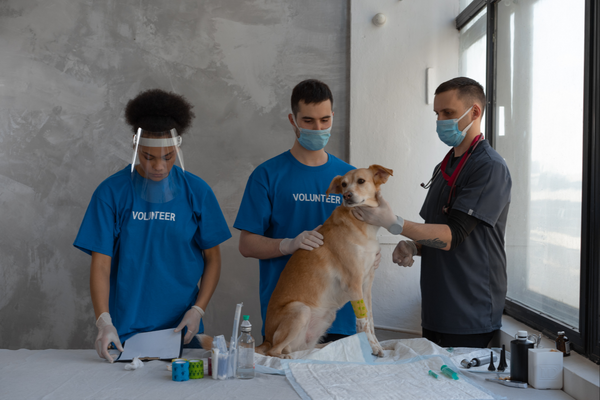It is usual for dogs to drink more water if they are bored, exhausted, or have exercised. Puppies, lactating as well as active canines need more water than usual. Active and nursing dogs drink a cup full of water or more regularly.
Sometimes, the dogs may need more water than usual. However, is your dog drinking water more than usual without any of the above mentioned reasons? Then, it could be a cause for concern.
Excessive thirst could signify polydipsia, a common observation amongst dog parents. However, it would be best if you did not ignore the symptom. Talk to the vet immediately, who will ask you to conduct some medical tests.
There could be several causes of excessive thirst in dogs, and some could be life-threatening if you don’t address them promptly.
So, if you are one of the dog parents who observe the symptom of polydipsia, here are the possible causes.
Medical Reasons for Excessive Thirst in Dogs
-
Problem with kidney:
Dogs with kidney problems pee more and drink more to stay well-hydrated. Kidneys are crucial organs of a dog’s body. They remove by-products or toxins from your dog’s blood and help regulate water and electrolyte balance in the body and produce urine.
Kidney diseases are treated by changing the dietary habits of the dogs and addressing the underlying causes of kidney failures like kidney stones or kidney infections. Dogs undergoing kidney failure issue may show the following symptoms-
- Increased thirst and urination
- Vomiting
- Loss of appetite
- Diarrhoea
- Lethargy
- Weakness
- High blood pressure
-
Cushing syndrome:
When the adrenal gland excretes an excessive amount of cortisol, either due to an adrenal tumor in the pituitary gland, it causes Cushing syndrome. Excessive cortisol increases thirst, and this also increases urination. You can treat Cushing syndrome with medication or surgery, depending on the position of the tumor.
Some of the symptoms of Cushing syndrome include the following-
- Increased urination
- Increased appetite
- Low energy
- Hair loss
- Heat intolerance
-
Urinary tract infection:
Urinary tract infection (UTI) is another reason your dog drinks excessive water. UTI may have the potential to become dangerous if left untreated. In addition to drinking excess water, your dog may also show the following symptoms in case of UTI-
- Frequent urination
- Blood in urine
- Foul-smelling urine
- Urinating in a small volume
- Difficulty in urinating
-
Diabetes Mellitus:
Diabetes mellitus is caused either due to decreased production of insulin or your dog’s body not responding properly to insulin. Insulin is used as energy to help your dog’s organ function appropriately. Lack of insulin in the body or body not responding to insulin can increase the blood sugar level in your dog’s body, and this causes hyperglycaemia.
You may notice the following symptoms if you want to detect diabetes in your dog-
- Increased thirst and urination
- Sticky urine
- Lethargy
- Increased appetite
- Weight loss
- Cataracts in dogs
Besides diabetes mellitus, dogs may also suffer from diabetes insipidus, where the dog’s body is not making enough antidiuretics hormone (ADH) or the kidney is not appropriately responding to ADH.
-
Liver disease:
Like kidneys, the liver helps filter toxins from the dog’s bloodstream. The liver can regenerate up to a specific limit. However, when 70% of the liver gets damaged, the organ can no longer filter toxins, and the dogs get compelled to drink more water to flush them out. The liver issue is often associated with jaundice.
Following are some of the symptoms your dog may show if he has a liver issue
- Yellowing of eyes, tongue, and gums in case of jaundice
- Vomiting
- Diarrhoea
- Change in the color of the face.
-
Addison’s disease:
Addison’s disease occurs due to the failure of adrenal glands to produce hormones essential for the body. Adrenal glands regulate hormones responsible for maintaining the balance of sodium, potassium, and water. However, when the immune system attacks this adrenal gland, it results in Addison’s disease.
-
Dehydration
Infections, illnesses, hot weather, and heavy exercise can cause dehydration in your furry friends. With increasing thirst, the dehydrated pet can face certain other symptoms to look out for, like dryness in the tongue, lethargy, and gums.
Symptoms of Primary Polydipsia Disease:
- Depression
- Lethargy
- Weight loss
- Bloody stool
- Increase thirst and urination
- Vomiting
- Diarrhoea
- Alopecia
- Loss of appetite
- Dehydration
- Painful abdomen
- Hyperpigmentation of skin
- Weak pulse
- Irregular heart rate
Some less serious reasons for your dog to be thirstier than usual:
- Your dog is exercising more intensely and frequently. It can lead to more water intake or consumption than what is usual.
- Remember that if your dog spends more time outside, he will likely drink excess water.
- In case of blood loss, there are chances that your dog may consume more water to make up for them.
- Dry weather or dry air can make your dog thirsty and consume more water.
- Switching to kibble from wet food or feeding a salt-based diet can make your dog thirsty.
- Sometimes psychogenic condition also contributes to the excessive water consumption by pet dogs.
- Making milk for the litter demands more water consumption.
Wrapping up!
Weather, diet, and activity levels can highly affect how much water your pet drinks. But excessive drinking can be an issue that needs medical intervention.
With the help of a few medical tests, you will be able to understand the main cause of increased thirst. Hence, it is significant that you must not ignore your dog’s extra trips to the water bowl.
Measure the quantity of water your dog usually consumes. If he goes over the normal limit, it is time to consult an experienced vet and seek the necessary advice to find the best cure for the situation.
Because a healthy dog is a happy dog! Ensure you ensure the best treatment for your dog to find the right cure for this problem.

 DogExpress
DogExpress


















 in Chandigarh, India.
in Chandigarh, India. 
